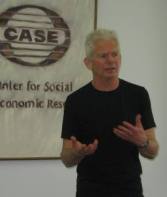“The Nordic experience is not a role model, but meant to be a society model”

On May 10, Professor Kalle (Karl Ove) Moene, gave his interpretation on the Nordic Experience at CASE Policy Research Seminar. He stressed the fact that institutions and policies need to “fit together” in order to achieve wealth.
In his presentation “Equity and growth – the Nordic experience”, Prof. Moene, Professor for Economics at the University of Oslo, evaluated whether the Scandinavian countries “have a recipe for trouble” or not. According to him, the Scandinavian countries have a “way of organizing their economies that asks for problems”. His argumentation is that such countries have: too much welfare state, too much social security, too strong unions and employer associations and too progressive taxes for the wealth of the economy.
Whatsoever, the Scandinavian countries’ foundation still lies within market orientation. So, how can a large welfare state and an efficient market economy go well together? Would not market forces erode social policies, or permanent government intervention destroy the market?
50 years of the Nordic experience prove those concerns wrong. According to Prof. Moene they are not just possible but they are complementary. High labour activeness has resulted in high productivity which, has made it possible to afford a large and universalistic social safety net.
The key is, according to Prof. Moene, that especially in Norway and Sweden, the governments, employer organisations and trade unions have been able to agree on wage compression since the 1930s, resulting in high productivity and international competitiveness.
Prof. Moene concludes his presentation with an overview of the equality in the labour market, the equality created by the welfare state and the interplay of them, which he referred to as the “equality multiplier”.
Please find attached Prof. Moene's presentation.
Video of the CASE Policy Research Seminar

